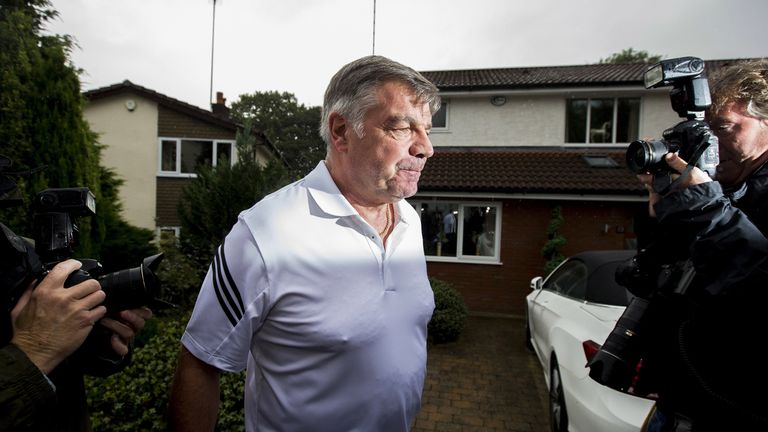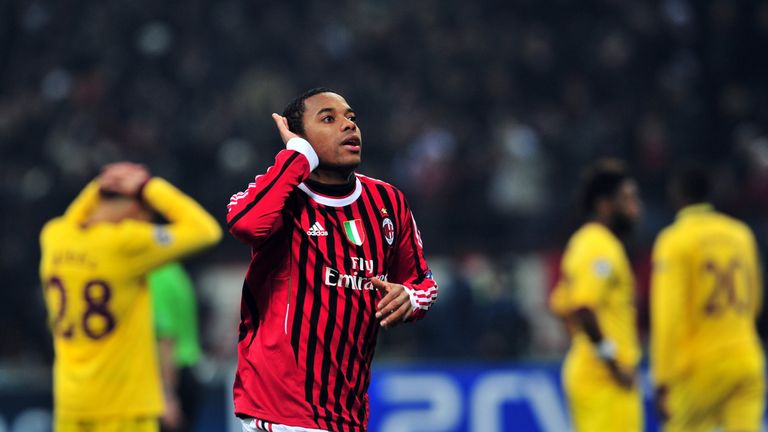Niall Quinn on Sam Allardyce and the problems of third-party ownership
Monday 3 October 2016 14:26, UK
In the movie The Big Short, a group of stock analysts made a lot of money by betting against the bubble that was the American subprime housing market about 10 years ago. If the same fellas are still around I wouldn't be surprised if they are watching the Premier League football bubble.
The game at the top end is definitely in a bubble, the incredible TV packages and current wage demands tell us that.
If the TV rights war plateaus, is English football prepared for a slowdown? Are there wage structures and strict ownership regulations and a sane transfer system in place? Is the game corruption free?
The last week has brought the game in England to a crossroads. I'm not sure it wanted to get to that crossroads but which direction it takes now will be very interesting.
When Shakespeare said: "That a rose by any other name would smell as sweet," the people who run football weren't paying attention. Last year it was decided that agents (boo, hiss) would no longer exist. Football would have 'intermediaries' instead.
Intermediaries. They sound like social workers. Good generous souls who bring harmony to places where there was none. There would be no more of the regulation that agents had to go through. Anybody who felt the calling could be an intermediary. You can go online and become an intermediary yourself if you are at a loose end.
Just over a year after agents became intermediaries the FA finds itself having to sack an England manager who had one match under his belt. It's a fine mess.
I know Sam Allardyce and his family a very long time and consider him a friend. He is good company and a funny story teller. He likes to dominate a conversation and he has a tendency to big himself up. I know a lot of agents (or intermediaries) too and as a breed they have that same trait. If you need a player who can defy gravity the agent will just happen to have Superman's nephew on his books. But you need him to play up to sixty games a year you say? "No problem, his mother's brother is Wolverine. He heals instantly this lad."
And if Sam were in the conversation he would chip in that he'd had Wolverine as a youngster at Bolton but he got rid of him because Wolverine wouldn't track back.
So, it's not really the stuff of Woodward and Bernstein, the Watergate reporters, to secretly film football people and agents talking big over drinks, but that's a discussion for journalists to have. I genuinely hope that conversation happens and that the media step up their scrutiny of our game.
I think the FA were right to give Sam his cards. As a manager of the national team he should have known better. Would a reprimand and an apology not have done? I don't think so, and Sam, unfortunately, chose to dilute his apology by blaming "entrapment" for his misfortune. There should have been nothing for anybody to entrap him with. It was a conversation that should never have happened.
When I arrived in England years ago the thoughts of walking into George Graham with an agent would have been a death wish. You went in and did your business on your own. Clubs and their strong managers had the upper hand.
Funnily enough it was Jerome Anderson, the DJ and stadium announcer at Highbury, who became one of the first big agents. Jerome decided to help Charlie Nicholas out and ended up representing nine of the 1989 Arsenal title team. He was the first agent to bring in international stars (he brought Dennis Bergkamp and Marc Overmars) and ended up becoming an early super agent.
It is ironic that when the Venky's purchased Blackburn Rovers they entrusted Jerome Anderson to advise them on the purchase and how to proceed when the deal was done. One of the first acts was to sack Big Sam. Alex Ferguson commented at the time that "Anderson couldn't pick his nose!"
Years later agents are all over the house. My hope is that by having taken the hard decision to move Sam on that the FA won't just return to business as usual. The FA can let the column inches fill themselves with months of speculation about who the next England manager will be or they can make some tough decisions.
One thing that the FA might have noticed about the secretly filmed conversations is about how commonplace and relaxed those sort of conversations are among football people. The transfer system we have lends itself to circumvention of normal best business practice in the first place.
It might have been better if we had evolved a system of trades and drafts like American sports operate, but football is a worldwide business stretching across so many jurisdictions that no fundamental change is now going to be possible. But we have to better police and regulate the system that we have.
There are so many things which mitigate against due diligence in our transfer system. Deadline Day is one of them. It is wonderful entertainment but everybody knows that on Deadline Day there will be madness in the air with managers desperate for a life jacket will cling to anything. And that's the honest end of the business.
Third-party ownership has been in the news this week. Some say third-party ownership is a form of modern-day slavery with a well-paid victim. The fact that lots of other people (except perhaps the club who developed the player) make off with part of the fortune is one of the smaller problems.
I first came across third-party ownership during a documentary I did a few years ago and spoke to the chairman of Robinho's club, Santos in Brazil.
Robinho had been sold to Milan for around £19m, but the club had ended up with only £1.5 million of that money.
That has become almost standard practice in Brazil and Argentina now. More recently it was third-party ownership and attempts to conceal it that cost the president of Barcelona his job after Neymar was purchased from guess who? Santos.
At a football club you have agents constantly hustling you to take players. They have the best young player in Africa, Manchester United want him but the agent will only let him go to you. The kid loves what you're doing at Sunderland. (Actually the kid thought he was going to Newcastle but hey, any port in a perfect storm)
When I was chairman of Sunderland I got a call from an agent one evening as the transfer deadline approached. "He's a great player, give him an easy medical and sign him. He won't let you down. Cheers."
The poor player, he had flown from Ghana and turned up at the gates of the football club ten minutes later. I had to get security to prevent him and his irate translator from entering my office. He went off and believe it or not signed for three years at another club down south the next day. He didn't work out, some agent though.
There are other problems apart from third-party ownership; we imagine it's just shady businessmen who buy players but often it is the agents themselves. We have the problem of tri-party representation where one agent acts for the player, another for the buying club club and even one more for the selling club. It's raining intermediaries in football right now.
The FA and the Premier League need to do a couple of simple things. Firstly, agents are employed by players. For heaven's sake the players should pay them. Not clubs. Second, that point should be re-inforced by introducing two types of license. One for agents who want to work on the side of the street representing players, another license for firms who will consult and help clubs with deals.
These firms should charge no more than the hourly rate of a good senior law firm. If an agent is caught acting improperly, the company he works for needs to take the hit, not just replace him with a surrogate while letting him operate as usual. Yes, this happens.
Finally perhaps we should admit that the current transfer system is more than a little mad and is anti-competitive in that we have created a brand of players who are only affordable to a handful of clubs. Down the road could we take a look at creating a price ceiling?
There are lots of other issues. Stockpiling players to lend out, a fair play levy to distribute some funds from the biggest transfers to grassroots and so on.
Will the FA step up? I have my doubts. They'll be worrying too much about whether the next England manager has to be English, squeaky clean or both. And so will the media.







